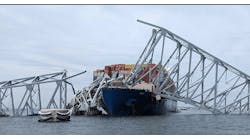Last week I blogged about how relieved a lift truck fleet manager was to cut the 15,000 invoices he was paying for maintenance every year down to one a month. He's using an OEM-supplied wireless fleet and operator management system. Who could argue with those results? Leave it to me to find someone.
His name is Michael Gary, and he's vice president of Sales & Customer Service at LTM Services, Inc., a fleet cost management consulting firm in the New York City area. Mike read my blog and responded that I was telling only 1/3 of the maintenance story. He maintains that those 15,000 bills that fleet manager received are more of an opportunity than a problem. By examining them more carefully they could help answer vital questions such as:
• Why were the repairs needed?
• What parts were purchased and at what cost?
• How long did each repair take?
• How many of those 15,000 invoices were repeat repairs?
• How many were properly related to abuse by operators or the warehouse environment?
• Was the full spend the right spend?
“A consolidated bill, while simpler and less time consuming, does not allow for the proper oversight and invoicing transparency truly required for comprehensive maintenance review,” he said. “That manager's company might not be receiving 15,000 invoices a year any longer but they are also not being offered the ability for the true understanding of their fleet costs.”
Feeling a bit defensive, I responded “This was not all about billing. While that company has consolidated its bills, they're also getting information down to the serial number level on their fleet. This helps them see trends and understand usage.”
I also mentioned that many smaller companies today don't have as many sets of eyeballs or the time to stay up on wear-and-tear trends, and that technology like this can be a handy tool.
But Mike wasn't done with me.
“If the billing is not being reviewed and assessed for all the detail and transparency, the serial number drill down information will not be accurate,” he responded. “If these fleet owners do their diligence they will find many excellent management firms whose offering is very much along the same cost lines as the forklift OEM systems without the need to add all types of sensors and hardware to their fleets.”
I checked out Mike's company website, and LTM is described as a firm that uses a “robust proprietary software solution in tandem with intensely seasoned and experienced analysts.” Those are the eyeballs I said that many fleet managers are doing without these days.
After reading this morning's Wall Street Journal I realized that companies like Mike's are performing a dual service. Not only are they assembling the pieces of that crazy complicated forklift maintenance puzzle, but they're employing a mature workforce to do it. A WSJ story titled “Oldest Baby Boomers Face Job Bust” notes that with U.S. unemployment at 8.6% and much higher among people in their teens and 20s, younger members of the labor pool are accusing Boomers of refusing to gracefully exit the workplace. “But their long-held grip is slipping, as employers look past older Americans to younger, cheaper workers.”
I'd like to see those kids sift through 15,000 forklift maintenance invoices and come up with coherent answers to those questions raised above. That's a job for a detective who has seen his or her fair share of burned-out transmissions and fried batteries.
So whether you use an OEM-supplied fleet management solution, hire a consultant, or employ your own seasoned citizens, be thankful for the many years of on-the-job engineering education that make your uptime possible.


